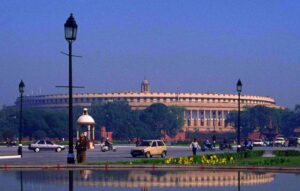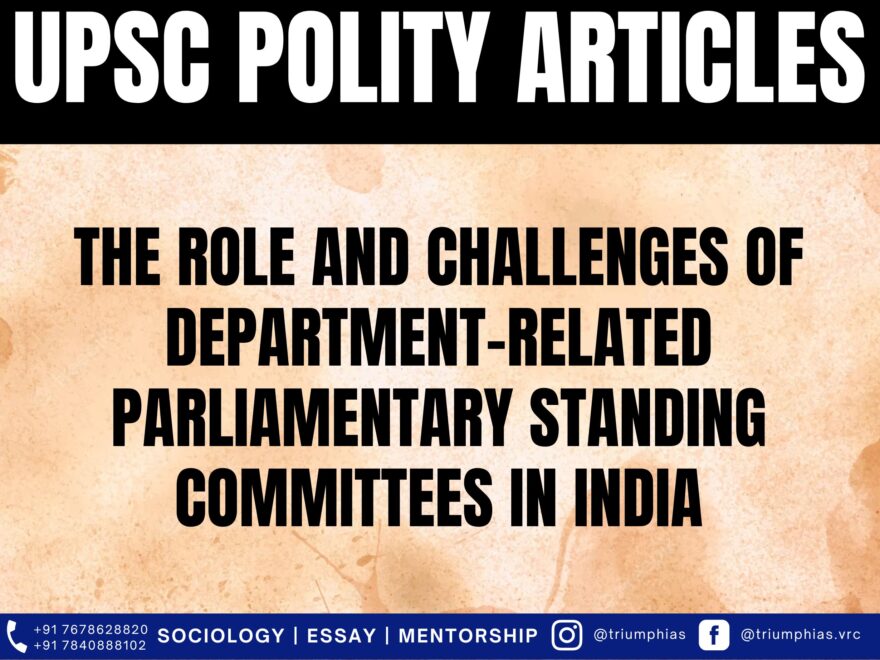Department-Related Parliamentary standing committees
(Relevant for Polity Section of General Studies Paper Prelims/Mains)

Department-Related Parliamentary standing committees
Department-Related Parliamentary Standing Committees comprise 31 members (21 from Lok Sabha and 10 from Rajya Sabha) to be nominated by the Speaker, Lok Sabha and the Chairman, Rajya Sabha respectively. The term of office of these Committees is not more than one year.
Parliamentary committees have consistently kept the administration vigilant, thus establishing a standard for parliamentary oversight. This is evident in the roles these committees fulfill, including:
- Scrutinizing the budgetary requests of relevant ministries/departments and presenting reports on their findings.
- Examining bills related to the concerned ministries/departments, as referred by the Chairman or the Speaker.
- Emphasizing the significance of long-term strategies and policies that guide the executive’s operations, these committees offer essential direction, advice, and insights for shaping comprehensive policy formulations.
- Facilitating input from experts and individuals directly impacted by policies or legislation.
However, the functioning of these committees faces several challenges, including:
- Meetings conducted behind closed doors, which raises concerns about transparency.
- The recommendations made by the committees lack enforceability.
- Not all bills are mandated to be routed through these committees, thus not guaranteeing comprehensive scrutiny of all bills.
- The committees cannot be considered highly specialized entities since their tenure lasts for just one year
Thus, though it is comparatively less difficult to examine an issue in depth by a committee of 30 than by an assembly of 700, the issues faced by these Committees limits their scope.
Sample Question for UPSC Sociology Optional Paper:
Question 1: What is the role of Department-Related Parliamentary Standing Committees in scrutinizing budgetary requests?
Answer: The committees scrutinize the budgetary requests of relevant ministries/departments and present reports on their findings, playing a vital role in parliamentary oversight.
Question 2: What concerns arise due to the closed-door meetings of Parliamentary Standing Committees?
Answer: Closed-door meetings raise concerns about transparency and public accountability in the functioning of these committees.
Question 3: Do the recommendations made by the committees have any enforceability?
Answer: The recommendations made by these committees lack enforceability, limiting their impact on policy and governance.
Question 4: Are all legislative bills mandated to pass through Department-Related Parliamentary Standing Committees for scrutiny?
Answer: Not all bills are mandated to be routed through these committees, thus not guaranteeing comprehensive scrutiny of all legislative proposals.
Question 5: Why can’t these committees be considered highly specialized entities?
Answer: The committees cannot be considered highly specialized due to their limited tenure of one year, which restricts in-depth expertise on issues.
To master these intricacies and fare well in the Sociology Optional Syllabus, aspiring sociologists might benefit from guidance by the Best Sociology Optional Teacher and participation in the Best Sociology Optional Coaching. These avenues provide comprehensive assistance, ensuring a solid understanding of sociology’s diverse methodologies and techniques.
Parliamentary Standing Committees, Lok Sabha, Rajya Sabha, Parliamentary Oversight, Budgetary Requests, Legislation Scrutiny, Policy Formulation, Transparency in Governance, Indian Polity, Parliamentary Standing Committees, Lok Sabha, Rajya Sabha, Parliamentary Oversight, Budgetary Requests, Legislation Scrutiny, Policy Formulation, Transparency in Governance, Indian Polity

Choose The Best Sociology Optional Teacher for IAS Preparation?
At the beginning of the journey for Civil Services Examination preparation, many students face a pivotal decision – selecting their optional subject. Questions such as “which optional subject is the best?” and “which optional subject is the most scoring?” frequently come to mind. Choosing the right optional subject, like choosing the best sociology optional teacher, is a subjective yet vital step that requires a thoughtful decision based on facts. A misstep in this crucial decision can indeed prove disastrous.
Ever since the exam pattern was revamped in 2013, the UPSC has eliminated the need for a second optional subject. Now, candidates have to choose only one optional subject for the UPSC Mains, which has two papers of 250 marks each. One of the compelling choices for many has been the sociology optional. However, it’s strongly advised to decide on your optional subject for mains well ahead of time to get sufficient time to complete the syllabus. After all, most students score similarly in General Studies Papers; it’s the score in the optional subject & essay that contributes significantly to the final selection.
“A sound strategy does not rely solely on the popular
Opinion of toppers or famous YouTubers cum teachers.”
It requires understanding one’s ability, interest, and the relevance of the subject, not just for the exam but also for life in general. Hence, when selecting the best sociology teacher, one must consider the usefulness of sociology optional coaching in General Studies, Essay, and Personality Test.
The choice of the optional subject should be based on objective criteria, such as the nature, scope, and size of the syllabus, uniformity and stability in the question pattern, relevance of the syllabic content in daily life in society, and the availability of study material and guidance. For example, choosing the best sociology optional coaching can ensure access to top-quality study materials and experienced teachers. Always remember, the approach of the UPSC optional subject differs from your academic studies of subjects. Therefore, before settling for sociology optional, you need to analyze the syllabus, previous years’ pattern, subject requirements (be it ideal, visionary, numerical, conceptual theoretical), and your comfort level with the subject.
This decision marks a critical point in your UPSC – CSE journey, potentially determining your success in a career in IAS/Civil Services. Therefore, it’s crucial to choose wisely, whether it’s the optional subject or the best sociology optional teacher. Always base your decision on accurate facts, and never let your emotional biases guide your choices. After all, the search for the best sociology optional coaching is about finding the perfect fit for your unique academic needs and aspirations.
To master these intricacies and fare well in the Sociology Optional Syllabus, aspiring sociologists might benefit from guidance by the Best Sociology Optional Teacher and participation in the Best Sociology Optional Coaching. These avenues provide comprehensive assistance, ensuring a solid understanding of sociology’s diverse methodologies and techniques. Sociology, Social theory, Best Sociology Optional Teacher, Best Sociology Optional Coaching, Sociology Optional Syllabus.
Best Sociology Optional Teacher, Sociology Syllabus, Sociology Optional, Sociology Optional Coaching, Best Sociology Optional Coaching, Best Sociology Teacher, Sociology Course, Sociology Teacher, Sociology Foundation, Sociology Foundation Course, Sociology Optional UPSC, Sociology for IAS,
Follow us :
🔎 https://www.instagram.com/triumphias
🔎https://www.youtube.com/c/TriumphIAS
https://t.me/VikashRanjanSociology
Find More Blogs
|
Scope of the subject and comparison with other social sciences |
|||
|
|
|
|
Modernity and social changes in Europe |

